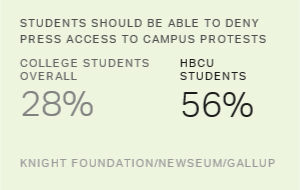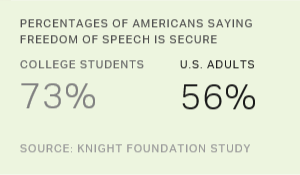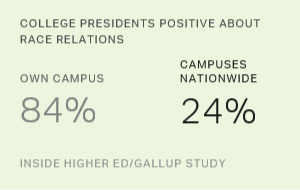Story Highlights
- 56% of HBCU students say students can deny press access to protests
- 45% say freedom of assembly is secure
- HBCU students more positive about racial climate on campus
PRINCETON, N.J. -- A majority of students at historically black colleges and universities (HBCUs), 56%, believe campus protesters should be able to deny the press access to protests. Those views contrast with the opinions of college students nationally, including black students at non-HBCU colleges, two-thirds of whom say the press should be allowed to cover campus protests.
| HBCU students | All college students | Blacks students, non-HBCU colleges | |||||||||||||||||||||||||||||||||||||||||||||||||||||||||||||||||||||||||||||||||||||||||||||||||
|---|---|---|---|---|---|---|---|---|---|---|---|---|---|---|---|---|---|---|---|---|---|---|---|---|---|---|---|---|---|---|---|---|---|---|---|---|---|---|---|---|---|---|---|---|---|---|---|---|---|---|---|---|---|---|---|---|---|---|---|---|---|---|---|---|---|---|---|---|---|---|---|---|---|---|---|---|---|---|---|---|---|---|---|---|---|---|---|---|---|---|---|---|---|---|---|---|---|---|---|
| % | % | % | |||||||||||||||||||||||||||||||||||||||||||||||||||||||||||||||||||||||||||||||||||||||||||||||||
| Yes, students should be able to deny access | 56 | 28 | 31 | ||||||||||||||||||||||||||||||||||||||||||||||||||||||||||||||||||||||||||||||||||||||||||||||||
| No, students should not be able to deny access | 43 | 70 | 67 | ||||||||||||||||||||||||||||||||||||||||||||||||||||||||||||||||||||||||||||||||||||||||||||||||
| Knight Foundation/Newseum Institute/Gallup | |||||||||||||||||||||||||||||||||||||||||||||||||||||||||||||||||||||||||||||||||||||||||||||||||||
The results are based on a Gallup poll conducted in partnership with the John S. and James L. Knight Foundation and the Newseum Institute that looks at HBCU students' views on First Amendment issues. The poll and its related report are a follow-up to a study released earlier this year that examines U.S. college students' and national adults' views of First Amendment freedoms.
Last fall, a wave of protests on racial matters swept through college campuses across the country. Those protests made clear that tensions can arise when individuals attempt to exercise their First Amendment rights. One prominent example of these tensions came at the University of Missouri when protesters, exercising their rights of free speech and assembly, attempted to block reporters, exercising their free press rights, from covering the protests.
HBCU students were especially attuned to those protests -- 43% said they heard or read "a great deal" about them, compared with 25% of all U.S. college students.
HBCU students are sympathetic to a variety of rationales protesters might have for denying the press access to a campus protest, including asserting a right to be left alone and believing the reporting will be unfair. This is in contrast to the larger population of U.S. college students who are divided on the legitimacy of those reasons.
| HBCU students | All college students | Blacks students, non-HBCU colleges | ||||||||||||||||||||||||||||||||||||||||||||||||||||||||||||||||||||||||||||||||||||||||||||||||||
|---|---|---|---|---|---|---|---|---|---|---|---|---|---|---|---|---|---|---|---|---|---|---|---|---|---|---|---|---|---|---|---|---|---|---|---|---|---|---|---|---|---|---|---|---|---|---|---|---|---|---|---|---|---|---|---|---|---|---|---|---|---|---|---|---|---|---|---|---|---|---|---|---|---|---|---|---|---|---|---|---|---|---|---|---|---|---|---|---|---|---|---|---|---|---|---|---|---|---|---|---|
| % Yes, legitimate reason | ||||||||||||||||||||||||||||||||||||||||||||||||||||||||||||||||||||||||||||||||||||||||||||||||||||
| People at event say they have a right to be left alone | 73 | 48 | 61 | |||||||||||||||||||||||||||||||||||||||||||||||||||||||||||||||||||||||||||||||||||||||||||||||||
| People at event believe press will be unfair in its reporting | 73 | 49 | 66 | |||||||||||||||||||||||||||||||||||||||||||||||||||||||||||||||||||||||||||||||||||||||||||||||||
| People want to tell their own story on the internet/social media | 62 | 44 | 53 | |||||||||||||||||||||||||||||||||||||||||||||||||||||||||||||||||||||||||||||||||||||||||||||||||
| Knight Foundation/Newseum Institute/Gallup | ||||||||||||||||||||||||||||||||||||||||||||||||||||||||||||||||||||||||||||||||||||||||||||||||||||
HBCU students may sympathize more with student protesters than the press because they express a high level of distrust in the news media. Seventy-three percent of HBCU students say they have little or no trust in the mass media to report the news accurately and fairly, compared with 59% of all U.S. college students and 61% of black students at non-HBCU colleges.
HBCU students might also side with protesters over the media because they believe free press rights in the U.S. are secure (75%), but they are much less likely to say the same about free speech (60%) and, in particular, free assembly (45%) rights. Their views on the security of free press rights are similar to those of college students nationally, but they differ on free speech and assembly rights.
| HBCU students | All college students | Blacks students, non-HBCU colleges | ||||||||||||||||||||||||||||||||||||||||||||||||||||||||||||||||||||||||||||||||||||||||||||||||||
|---|---|---|---|---|---|---|---|---|---|---|---|---|---|---|---|---|---|---|---|---|---|---|---|---|---|---|---|---|---|---|---|---|---|---|---|---|---|---|---|---|---|---|---|---|---|---|---|---|---|---|---|---|---|---|---|---|---|---|---|---|---|---|---|---|---|---|---|---|---|---|---|---|---|---|---|---|---|---|---|---|---|---|---|---|---|---|---|---|---|---|---|---|---|---|---|---|---|---|---|---|
| % Very secure/Secure | ||||||||||||||||||||||||||||||||||||||||||||||||||||||||||||||||||||||||||||||||||||||||||||||||||||
| Freedom of the press | 75 | 81 | 74 | |||||||||||||||||||||||||||||||||||||||||||||||||||||||||||||||||||||||||||||||||||||||||||||||||
| Freedom of religion | 62 | 68 | 57 | |||||||||||||||||||||||||||||||||||||||||||||||||||||||||||||||||||||||||||||||||||||||||||||||||
| Freedom of speech | 60 | 73 | 62 | |||||||||||||||||||||||||||||||||||||||||||||||||||||||||||||||||||||||||||||||||||||||||||||||||
| Freedom to petition the government | 56 | 76 | 69 | |||||||||||||||||||||||||||||||||||||||||||||||||||||||||||||||||||||||||||||||||||||||||||||||||
| Freedom of assembly | 45 | 66 | 40 | |||||||||||||||||||||||||||||||||||||||||||||||||||||||||||||||||||||||||||||||||||||||||||||||||
| Knight Foundation/Newseum Institute/Gallup | ||||||||||||||||||||||||||||||||||||||||||||||||||||||||||||||||||||||||||||||||||||||||||||||||||||
Of the five rights that the First Amendment guarantees Americans, HBCU students differ most from the national college student population in their perceptions that freedom of assembly and freedom to petition the government without fear of retribution are secure in the U.S.
HBCU Students Comfortable With Exercise of Free Speech Rights on Campus
The poll also assessed HBCU students' views on the exercise of speech rights on campus and the racial environment at their college.
-
HBCU students (70%) are similar to the larger population of U.S. college students (78%) in saying colleges should foster open learning environments that allow a wide range of expression, including offensive speech. A smaller 29% of HBCU students and 22% of all college students instead believe that campuses should foster positive learning environments that prohibit potentially offensive speech or expression.
-
While college students nationally are more likely to agree (54%) than disagree (46%) that the racial climate on their campus prevents people from saying things they believe because others might find them offensive, HBCU students take the opposing view. Fifty-six percent of HBCU students disagree that their campus climate prevents students from expressing their thoughts, while 44% agree.
-
HBCU students (68%) are similar to college students nationally (71%) in saying the steps their college has taken to adopt campus policies aimed at deterring offensive or biased speech have "been about right." However, black students at non-HBCU colleges (54%) are less likely to say the same; 42% say their school has not gone far enough.
-
HBCU students report a more positive racial climate on their campus (41% describe it as "excellent") than college students nationally (26%) and black students at non-HBCU colleges (20%). These differences may reflect the majority-minority composition of student bodies at HBCU colleges.
Implications
College protests last fall called attention to the ongoing challenges of achieving racial equality on many campuses, but also the tensions that can flare when First Amendment rights are fully exercised. Students at historically black colleges and universities were closely following the news about the protests, but their college environment and experience are different from those of many of the students participating in the protests.
Nevertheless, HBCU students largely sympathize with the claims of the protesters over those of the press. HBCU students' antipathy toward the media and their belief that free assembly rights are less secure than free press rights in the U.S could be shaping those sympathetic views. However, protests also may be influencing how HBCU students view the media and assess the security of the various First Amendment rights.
For the full report, visit the Knight Foundation website.
Survey Methods
Results for this Gallup poll are based on telephone interviews conducted Feb. 29-June 9, 2016, with a random sample of 302 students, ages 18 to 24, who are attending a historically black college and university. For results based on the total sample of HBCU students, the margin of sampling error is ±6 percentage points at the 95% confidence level.
For results based on the sample of 3,072 U.S. college students, ages 18 to 24, interviewed Feb. 29-March 15, 2016, the margin of sampling error is ±3 percentage points at the 95% confidence level.
For results based on the sample of 357 black students at non-HBCU colleges interviewed Feb. 29-March 15, 2016, the margin of sampling error is ±7 percentage points at the 95% confidence level.
All reported margins of sampling error include computed design effects for weighting.



